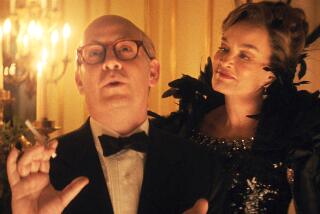Book Review : Four Characters in Search of Less Grandiloquent Prose
Four Lives in Paris by Hugh Ford; foreword by Glenway Wescott (North Point: $19.95)
Nothing I can write, and Iâm afraid itâs pretty hard, can be as hard on âFour Lives in Parisâ as the authorâs prefatory hope that it will be compared to Lytton Stracheyâs âEminent Victorians.â
Hugh Fordâs intention is to capture the world of American expatriates in the 1920s by the same method that Strachey used when he delivered late Victorian England on the point of his rapier. Like Strachey, Ford selects a gallery of individuals to stand for their time. Avoiding the glory figures--Hemingway, Stein, Fitzgerald and so on--he chooses lesser ones. That may be a problem; the real problem is that his instrument is no rapier but a potato-masher.
Two of Fordâs four exemplars are George Antheil, a composer, and Kay Boyle, the writer. It is harder to categorize the other two. One is Harry Stearns, who wrote some sharp things about the vulgarity of American culture, expatriated himself to Paris in 1921, disintegrated spectacularly for 11 years, returned, married wealth, and wrote some further sharp things renouncing his previous convictions. The other is Margaret Anderson, whose Little Review flared gloriously when Ezra Pound used it for his chosen instrument--it was the first to publish large sections of James Joyceâs âUlyssesâ--and faded away when he lost interest.
Boyle is by far the most substantial and interesting of the four, and there are times when the interest shows through. These tend to come when Ford is relaxing or not trying very hard. When he tries hard, which is most of the time, he produces prose so grandiloquent and trite, so lofty and so soft that it creates white-out around whatever it is that he is trying to reveal.
Here he sums up Boyleâs stormy years in France, which included living with the French family of her first husband, Richard Brault, and spending some time in a kind of commune run by Raymond Duncan:
âFled in Disgustâ
âShe had freed herself from the insularity of the Braults, fled in disgust from the cozenage of Duncanâs colony, revolted from the labyrinthine enfoldings of concupiscence, and rejected the ruthless machinations of wealth.â
Antheil is introduced as follows:
âA child of the century, George Johann Carl Antheil was born on July 8, 1900, in Trenton, New Jersey, then as now a gray industrial city spread along the banks of the fabled Delaware River. . . .â
Fabled Monongahela, Piscatinny and Hackensack. Having acquired a Philadelphia patron, Mary Louise Bok, Antheil made his way to the fleshpots of Berlin where, Ford tells us, âfor a pittance a Russian princess would be his mistress.â Whether the pittance and the princess were ever actually exchanged is not clear; in any event, Antheil moved on to Valla, âthe wildest, most devilish creature in Berlin.â
Still later came Boski, âthe virile woman George would eventually subdue and love.â Before this happened, he moved to Paris. There he took up residence upstairs from Shakespeare and Company which, Ford tells us, became âthe most famous book shop in the world.â Its proprietor, Sylvia Beach, had just published âUlyssesâ complete; quite a step for someone who had grown up âin the hushed confines of her fatherâs Princeton rectory.â
Race-Track Tipster
As for Stearns, drinking and disillusion reduced him to becoming the race-track tipster for the Paris Herald. In case we miss the point, Ford presses it home:
âAbandoning a career that had challenged and invigorated his critical powers and had made him the spokesman for a disenchanted generation to take a twenty-dollar-a-month job as race-track reporter seemed to verify that he was determined to ruin not only himself but also his career.â
These are not carefully selected examples. They pile up on page after page. A reviewer, taking notes, ought to move on and tell us where the writer is going or has gotten to.
Except for Boyle, none of Fordâs subjects accomplished very much of great interest. Antheil had a talent for outrageousness as well as for patronage--he wrote that Pound, who helped him, was a better musician than Stravinsky--but musically he is considered to be only a very minor talent. His âBallet Mechaniqueâ was loved and hated in Paris, and mostly hated in New York; and history has so far failed to come to its rescue. He went on to write accomplished film scores and a popular medical column. Stearnsâ writing does not live. Andersonâs more significant editing work, in large part, seems to have been Poundâs.
Essentially, the author has tried to get close to his characters without taking the next step: to stand back, characterize them, and deliver them to some larger and more provocative context. He quotes them at length, and while this can work well enough with Boyle, in the other cases, it results in a great deal of murky and self-indulgent vaporing.
More to Read
Sign up for our Book Club newsletter
Get the latest news, events and more from the Los Angeles Times Book Club, and help us get L.A. reading and talking.
You may occasionally receive promotional content from the Los Angeles Times.









